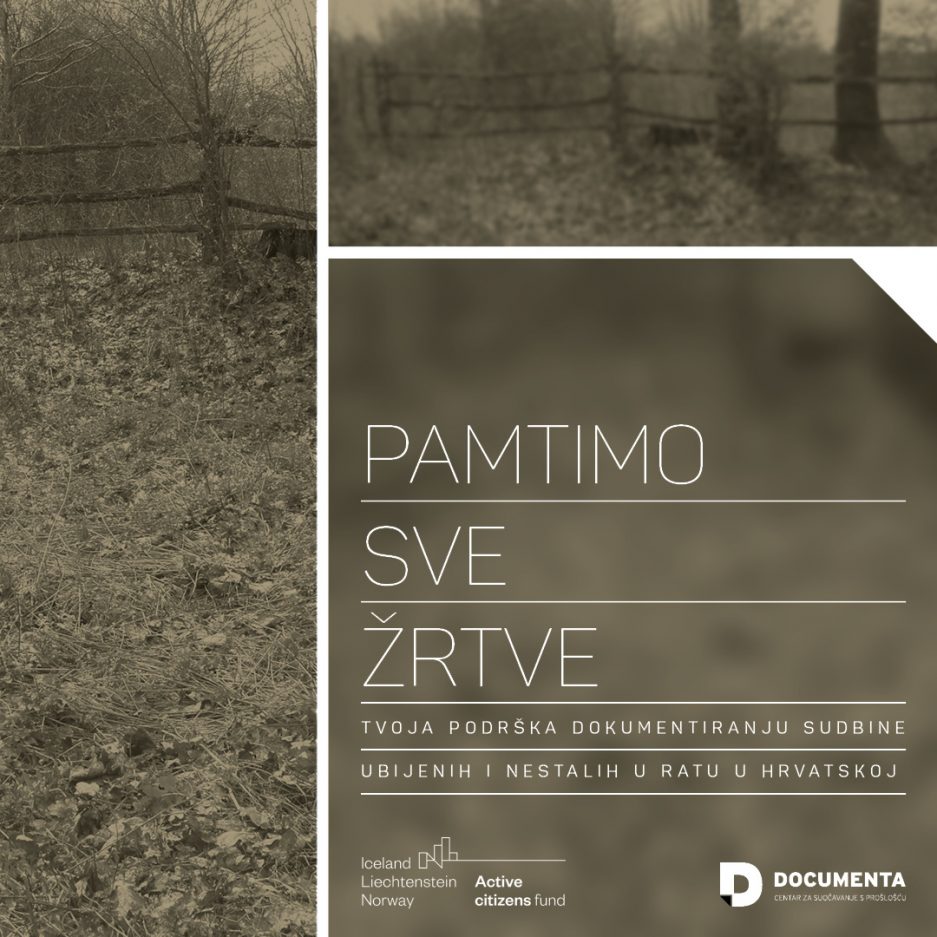We remember all victims – Your support in documenting the fate of those killed and missing in the war in Croatia

More than thirty years since the beginning of the war in 1991, there is no integral and publicly available list of war victims and missing persons who resided in the territory of the Republic of Croatia. Throughout the years, relevant state and civil institutions and organizations have published various victims’ lists focused on individual segments of the population that suffered in the war, such as the civilian population of certain villages, cities or regions, and lists of killed soldiers published by veteran organizations of their individual units. The suffering of Croatian soldiers is mostly well documented through the publications of their units’ organizations, while the situation for the civilian population varies considerably. Namely, during the war, as well as in the post-war period, more attention was paid to listing the casualties of members of military units.
A public list of all victims who resided in Croatia at the time of suffering is a civilizational obligation to pay tribute to the killed and disappeared, and at the same time an attempt to create a realistic, verifiable and factually based overview of their suffering. We believe that the facts about war suffering can no longer harm anyone, but only have a beneficial effect on reducing manipulations in public space. Such a document could become an important part of the common and public history.
Research
In our research, we have seen that certain sufferings on the Croatian side are poorly documented. This mainly concerns the victims from Vukovar and its surroundings. The research of human losses in that region is met with paradoxes that are a reflection of the public and political narrative about Vukovar as a hero city – while the majority of Croatian military victims are well documented, there is almost no data for the civilian vivctims, women, the elderly and victims of other nationalities. We encounter similar problems in other regions as well. It is not uncommon that in the case of some victims, there is different information about the place, time and circumstances of their suffering.
(Field)work
Documenta started its systematic research back in 2009. Since then, we have conducted more than 8000 interviews with individual witnesses, covering tens of thousands of kilometers across Croatia. Our researchers analyzed the available lists of official state bodies, monographs, and plenty of court and administrative documentation. We have developed our own infrastructure and methodology that enables the processing and storage of large amounts of data and documents. We held a large number of meetings with a number of responsible persons, representatives of local, regional and national authorities and various institutions.
We collaborated with a number of institutions and organizations in the country and the region. Our close partners are the Humanitarian Law Center from Belgrade which has done a lot for the visibility of Croatian victims in Serbia, and and the Research and Documentation Center from Sarajevo. These organizations, along with the work of Humanitarian Law Center Kosovo did an exemplary job in creating a list of persons killed in Bosnia and Herzegovina and in Kosovo.
Our work is based on the principle of impartial and equal treatment of all persons killed and missing in war, as victims of that war. Due to this approach, unjustified objections arise that we prefer one side. The publication of information about non-Croatian victims resonates all the more strongly, as they are realistically unrepresented and therefore less visible in the public space in Croatia. Even less justified are the attacks that suggest that our work calls into question the character of the Homeland War. Documenta‘s goal is to approach war events and the post-war period as objectively and comprehensively as possible, while critically questioning the various dimensions of that complex time.
Creating a list of victims and your support
The creation of a complete list of persons killed in the war is not only a matter of symbolic justice and honoring the victims, but also an effective means to talk about the war in a factually based manner. Discussions about the war are often conducted in a heated and manipulative manner. Such a list creates a solid documentary basis that can contribute to the rationalization of the social, political, institutional and individual articulation of these discussions and to the improvement of their quality.
Therefore, we invite you to support our crowdfunding campaign “We remember all victims” and give your support to documenting the fate of those killed and missing in the war in Croatia.
Link: https://gogetfunding.com/pamtimo-sve-zrtve/?lang=en
Once again, we invite family members, friends and all those who knew the victims or know something about their suffering to contact us, so that we can succeed in creating the most complete and credible list of victims.
You can also make your donation by payment to the following account:
Account holder: Documenta – Center for Dealing with the Past
Address: Selska cesta 112c, 10000 Zagreb
IBAN: HR38 2484 0081 1029 3079 3
Bank: Raiffeisenbank Austria d.d., Zagreb
Payment description: We remember all victims
SWIFT: RZBHHR2X
The crowdfunding campaign ”We remember all victims” is carried out as part of the project “Public dialogue on the fate of the killed and missing: we remember – and you?”, supported by the Active Citizens Fund.
-630x221.png)









